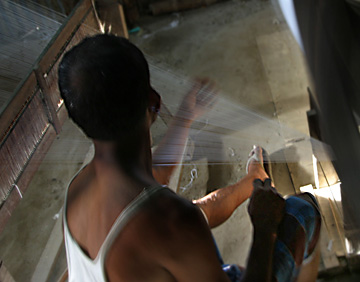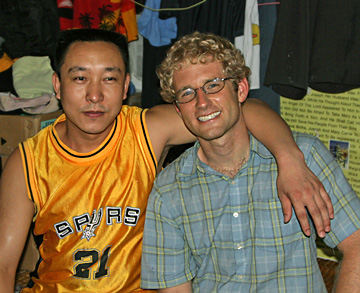Kelsey Timmerman: Travels With His Underwear
Travel Interviews: He talks to Michael Yessis about his quest to find the people who made his clothes
12.17.08 | 10:10 AM ET
 Photo by Kelsey Timmerman
Photo by Kelsey TimmermanHow bad did Kelsey Timmerman want to see the places where his clothes were made and the people who made them? To finance his travels, he took out a second mortgage on his home. He tells of that moment and his ensuing quest in the book Where Am I Wearing? A Global Tour to the Countries, Factories, and People that Make our Clothes.
Timmerman also wrote What Every Traveler Should Know About Disposable Underwear for World Hum. He was inspired to write the story after seeing disposable underwear at a mid-level Chinese hotel he stayed at while researching his book. I interviewed him via email.
World Hum: You write in “Where Am I Wearing?” that you read a lot of books about globalization. Where do you see your book fitting into the genre?
Kelsey Timmerman: I’m not Thomas Friedman. I don’t have an intricate understanding of our global economy. I find those types of book fascinating, however I’m often left wanting to know more about the lives of the people that globalization influences. I want to know about their hopes and dreams and what they think about my paying a half-month’s worth of their wages for a pair of underwear that they made. Other books feature glimpses of this, but mainly they focus on policies, politicians, CEOs and NGOs.
I meet with a few businessmen in the book, but mainly I seek out the garment workers and their families. I visit their villages, play soccer with the children they haven’t seen in three years, ride a roller coaster with them, take them bowling, and play drinking games with uncles. I laugh with grandparents over exotic freshly picked fruit, and hear family histories related from toothless matriarchs swinging in hammocks. I try to look at the global economy from their perspective and from my own as an average American consumer.
You also mention you’re a touron—“one part eager tourist and one part well-meaning moron.” How do you think your touron-ness affected your travels and the book?
I’ve never been somewhere I haven’t made a fool of myself. Try as I might to not disrupt the ebbs and flows of daily life, regardless of how exotic the locale, I always seem to find spectacular ways to fail. I often refer to myself as The Great Touron King. Travel has taught me to laugh at myself for being the touron I am. And laughing at yourself is pretty much required if you visit a country because your underwear were made there.
Trust me, I wasn’t laughing alone. From my post-strike celebration dance in Phnom Penh’s only bowling alley, to my inability to pronounce any name more foreign than “Smith,” garment workers around the world shared chuckles at my expense.
I found parts of the book laugh-out-loud funny. You write things like: “James Bond fought communism. So did my grandpa’s underwear.” Did you set out to inject humor into the book, or did it evolve from these encounters? And what were your thoughts about using humor for a subject that’s often approached in such a serious way?
To laugh is human.
Ooh, did I just make that up? Excuse me while I Google ...
Darn! Some French writer/doctor/dirty-joke-teller named Francois Rabelais beat me to it. He said, “To laugh is human, to be human is to laugh.”
My point is that I don’t think it’s possible to relate to others without a little laughter here and there.
It was never anything as deliberate as, “I’m going to write a book about the garment industry, and I’m going to make it funny.” This book was more about the living of it than the writing of it. And laughing at myself and the world during the living of this book happened nearly every day.
There is a time and place for humor, and I hope I chose mine to accurately reflect the moment. Without a doubt there are plenty of unfunny subjects in this book. My goal from the outset was to connect readers with the workers I met, and I feel that humor was an important tool to do this. The workers are often seen as statistics of hours worked and wages received, but numbers dehumanize. If you really want to get to know someone, you need to find out what makes them laugh and what makes them cry.
 Dewan (left) and the author. Via Kelsey Timmerman
Dewan (left) and the author. Via Kelsey TimmermanYour OneDerWear story for World Hum features an anecdote from China, one of the places you write about in your book. We hear so much about the country these days. When you think of China now, what comes to mind?
I think about Dewan and his wife Zhu Chun who made my flip-flops. I wonder if they’ve seen their 13-year-old son, Lin Xin, yet. When I left them, they hadn’t in three years.
I think about how, when I presented them with a framed picture of Lin Xin I had taken when I went to visit him, they stashed the photo away instead of displaying it. I didn’t know if they didn’t have a way to hang it on the wall or if it was too painful to look at.
I think about how the law limited their work hours to 44 per week, and how they actually worked 100 hours per week.
I think about the Wal-Mart I visited near Guangzhou, how odd it was, and how a part of me hoped that someday Dewan and Zhu Chun would shop there. But another part of me was a little frightened what their arrival to China’s middle class would mean for the rest of the world, already bursting at the seams with consumers.
Do you stay in touch with Dewan and Zhu Chun or their son, or anyone else you met during your travels?
The workers I met don’t email. And while most of them have cell phones, the language barrier is an issue. I’m hoping to get copies of the book into their hands through my translators. I keep in touch with several of them, especially Dalton from Bangladesh. He’s always trying to pull me into a business deal, despite me constantly telling him I’m not interested.
In Bangladesh I went undercover as an underwear buyer, and I still get emails from folks who think I’m in the business. They’re still waiting on my big order of Jingle These underwear.
How did people you met during your travels generally react to your quest?
At first Dewan and Zhu Chun thought I was a garment buyer, so they told me how great their job was and how happy they were. Once they realized and believed that I wasn’t, they started to tell me about the realities of their life.
For the most part, everyone was a little hesitant at first. Most of the workers had never talked with a foreigner. Once they became more comfortable, they had as many questions for me as I had for them.
They thought my reason for coming all the way from the U.S. to visit with them was odd. But I suspect if someone from Bangladesh or Kyrgyzstan (think Borat) showed up at where I worked and started asking me questions, I wouldn’t know what to think.
What plans do you have to write more about this subject?
In a way I hope I never stop writing about this subject. I’m not talking about the garment industry, specifically; I don’t know if I’ll come back to that or not, at least not in book form. But I see myself writing about people whose stories have remained largely untold, for years to come.
I think the more we can connect with people and places elsewhere, the more we’ll care about them. I know that when I hear news about Kosovo, Nicaragua, Honduras or any of the other places I’ve been to, I care more because I can place faces and families whose lives may have been disrupted by the news.
One of my first paying writing gigs was doing a travel column for a small paper in rural Ohio. A large portion of the readership hadn’t been out of the Midwest, let alone the country. I was amazed at the response I got from them and how much they connected with the people I wrote about. I got paid $5 a column, but I couldn’t have felt more fulfilled.
I still can’t.
Finally, I need to ask you about the OneDerWear. Where was it made, and will you ever wear it again?
Hell. No.
You read the article didn’t you? I thought you edited it. Surely you didn’t miss the part about them smelling straight out of the packaging or their itchiness nearly causing a car accident, did you?
They were made in Vietnam. It was tough to find the label because it was so small since washing instructions aren’t required. As the packaging says, “Just wear and toss!”
I tossed mine.![]()
Tim Patterson 12.17.08 | 11:12 PM ET
Great interview - I haven’t read Kelsey’s book yet, but he seems like a great guy and it’s at the top of my reading list.
John M. Edwards 12.19.08 | 10:49 PM ET
Hi Kelsey:
It’s kind of odd. In years of travel on five continents and in hundreds of countries, the main memory I have of the road is carrying a backpack full of dirty laundry. If the clothes make the man, maybe that’s why traveler’s go native in some countries, capering around, par example, in a pair of Bali pants and a locally made floppy hat.
I miss that detergenty smell of overwashed jeans carefully folded in my pack for the next stop.
Your book idea is as strange as it is determined. I look forward to wearing it.
Kelsey 12.22.08 | 12:16 PM ET
Tim, Thanks.
John, My clothes are usually stuffed in my back wet and streaked white with the bar of soap I washed them with. I can’t say I miss that a whole lot. Hope the book fits!
Grizzly Bear Mom 12.31.08 | 4:29 PM ET
I loved seeing a picture of the author with one of his subject and recommend a photo with each article. It helps me identify with the author.
I used to live in Korea, where labor is cheap. It seemed undignified for me to pay someone tso little to clean my house, so I cleaned my own. Looking back at my decision, I deprived someone of wages. Oh well, we learn as we grow.